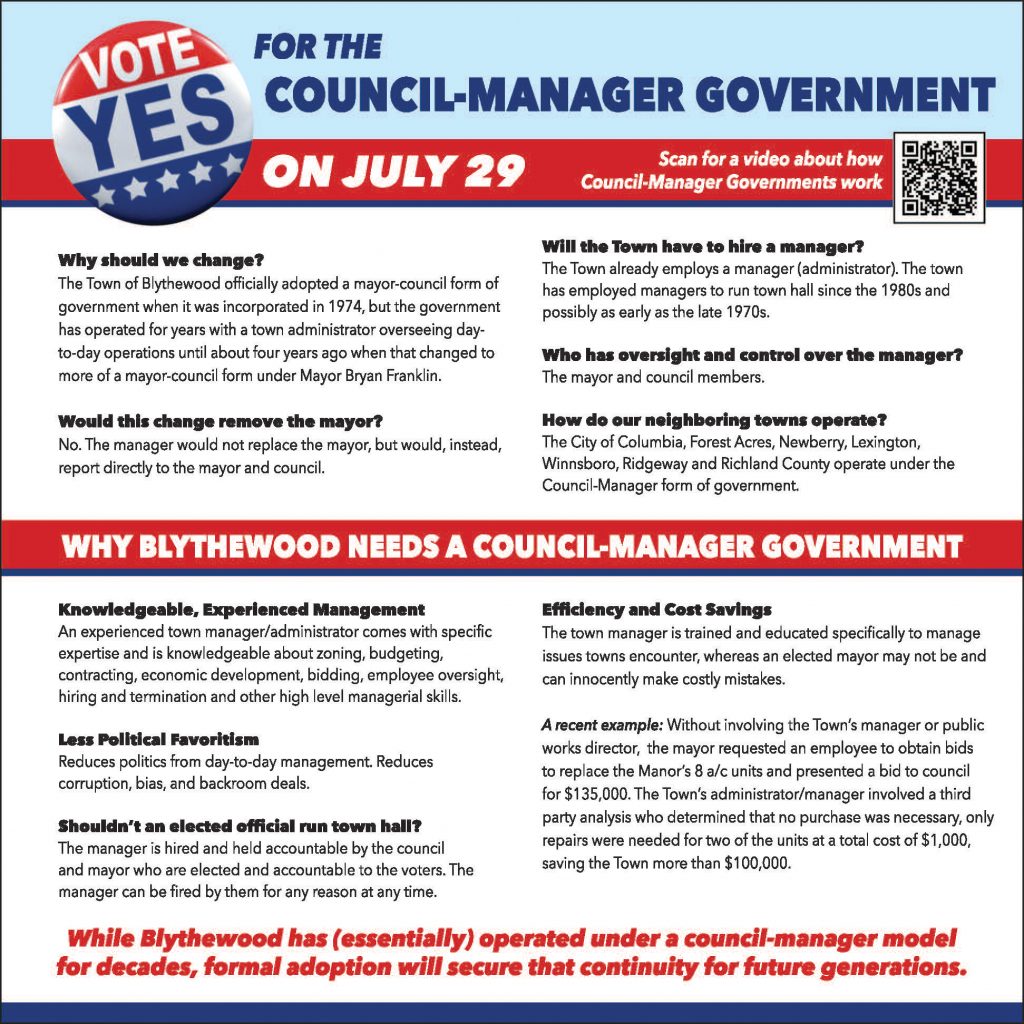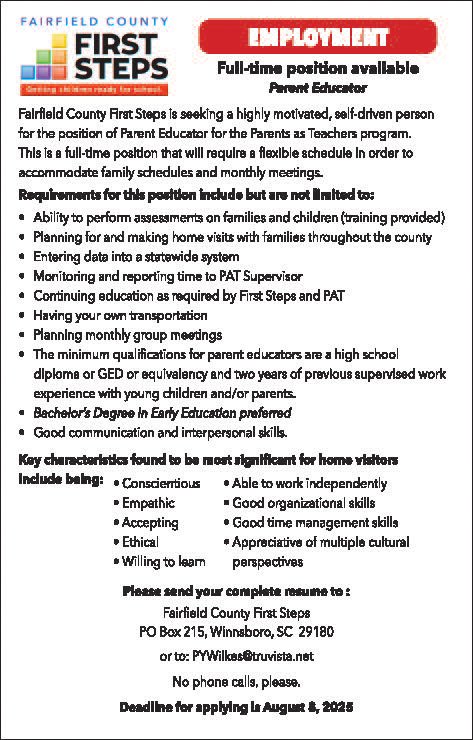WINNSBORO – After months of political wrangling, debate and delays, County Council Monday night at last made an affirmative decision regarding recreation spending. In a 6-0 vote – Councilman Mikel Trapp (District 3) was absent from the meeting – Council decided to decide how recreation projects would be approved for each district.
The vote put to rest the incessant bickering that had plagued Council in recent months over whether individual Council members or a majority vote by the entire Council would have the authority to green-light projects out of this year’s $24 million bond issue, $3.5 million of which – divvied out in $500,000 lumps to each district – was devoted to recreation.
But discussion of the vote on how Council would vote was temporarily derailed as Council members quickly became bogged down in the nuts and bolts of individual projects, rather than the process of how those projects would begin to even take shape.
“I need some structure, if we’re going to vote on this,” Councilman Kamau Marcharia (District 4) said. “(Previous) Administrators have already spent hundreds and hundreds of thousands of dollars without us interfering on recreation, but now we’re going to have Council voting on recreation?”
Marcharia was referring to the more than $800,000 the County has spent refurbishing and building a new football field at Drawdy Park in District 6, a project of which Marcharia has been vocally critical during recent meetings and one that he said Council never specifically approved. Chairman David Ferguson (District 5) once again reassured Marcharia that the Drawdy Park project was part of the County’s capital improvements fund and was approved during the budgeting process.
Vice Chairman Dwayne Perry (District 1) put the ‘majority vote’ motion on the floor, which was seconded by Councilwoman Mary Lynn Kinley (District 6).
“District 2 does not have a plan,” Councilwoman Carolyn Robinson (District 2) said, “and probably won’t have a plan for a while, because we’ve been too busy to actually get out and work the district. District 2 does not have any plan or plans to have a plan in the next two months.”
Robinson said she wanted assurances that the projects would have a dollar figure attached to them when they came back before Council for a vote.
“There are so many things that have come down when I was off Council to the previous administrator who had the right to go out and had ad infinitum to do anything in regards to spend those kinds of funds,” Robinson said. “We never truly, even this past year, went through item by item and discussed those budgets as to what was included.”
Perry confirmed that his motion called for each individual project to go through administration in order to obtain cost estimates, after which the projects would come back to the full Council for a final vote.
Councilman David Brown (District 7), meanwhile, said he was concerned about what he called “mid-year appropriations,” and questioned whether or not the funds existed to staff the projects, specifically Marcharia’s proposed recreation center in the Dawkins community.
“We’ve got to come up with a job description of what these people are going to be doing,” Brown said. “And in our present budget are there places and positions in the budget that we can fulfill these people or is that going to throw our budget that we’ve presently got into the negative because we’re going to be hiring these people before the end of the year to run some of these operations with no personnel slot for these people to be paid out of?”
Milton Pope, Interim County Administrator, said his staff had compiled a master list of the projects. Once Council had adopted the method by which they would begin approving these projects, Pope said, and once Council adopted the master list, his staff would begin working on the cost estimates. Those estimates, Pope said, would include staffing.
“The only finite thing that we have at this point is the dollar amount,” Pope said. “We know what dollar amount we can’t exceed.”
Pope added that staffing could not be paid for out of the bond, and if staffing of facilities drove costs beyond the $500,000 threshold, those projects would have to come back to Council in order to be trimmed down.
“That would also possibly give Mrs. Robinson additional time to do what she’s working on with her district,” Pope said. “But, in order to activate the staff, we need you to OK the list and we can get cost estimates on that.”
But Marcharia said he detected an attempt to hold back his project in District 4.
“I see this as another stall tactic,” Marcharia said. “We have ample time to talk about staff. They haven’t even cleared off the ground, you don’t have any ground. You (Perry) want a pool room and all that. I guess you’re going to have to pay for a staff to run that. I’ve got $500,000 and I have a plan. Take my plan and tell me where the $500,000 cuts off and start working. I can’t have that done?”
Ferguson then brought the discussion back to earth.
“Let me clarify what this vote is about,” Ferguson interjected. “This vote isn’t about what we’re talking about. OK? This vote is about how the process is going to work and who’s going to be voting on what. That’s the only thing on the floor at this present time.”
And, Ferguson said, once one district was ready to move forward there would be no waiting on the other districts before that work could proceed. But Robinson, moments before the vote, asked if the language in Perry’s motion was suitable for the bond attorneys.
“Because we’re dealing with this bonding attorney, because everything has to be in legal verbiage, why don’t we have a written out presentation as to how we say it so it will pass and be able to be put into the bond exactly right tonight?” Robinson suggested. “It needs to be a little more detailed than that. You need a little more legal verbiage than what we’re saying to accomplish this tonight.”
Jack James, the County’s attorney, said Council could go into more legal depth if they wished, but left the matter at Council’s discretion. Pope, meanwhile, said that since Perry’s motion was for Council to act in a manner consistent with state laws, complicating the motion with legalese was unnecessary.
After the vote passed, there was a brief debate among Council members as to what the vote meant.
“Did we vote to give the Administrator the option to go ahead and move ahead individually?” Marcharia asked.
“If you’re ready to move ahead with your project,” Ferguson answered, “that’s exactly what we just did.”
“I’ll see you later tonight, Mr. Pope,” Marcharia nodded to the Interim Administrator.











